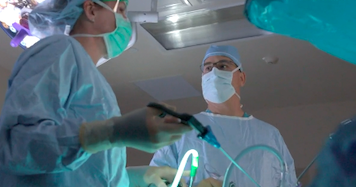Dr. Balette was recently featured on KHOU-11 discussing bariatric weight loss surgery and COVID-19.
While the COVID-19 pandemic is a threat to everyone’s health and can cause serious complications, the risk for those with certain conditions may be greater. Obesity is one of the most serious conditions, and people who are overweight may also be at greater risk for COVID-19 complications.
Why is obesity associated with greater COVID-19 complications?
Obese individuals are at greater risk for serious medical conditions, including high blood pressure, heart disease, diabetes, and certain types of cancer. Lung disease, inflammation, and immune decline are also common in obese people. These problems are magnified when you add COVID-19.
Dr. Balette says that the combination presents a medical challenge. Patients with obesity who are diagnosed with COVID-19 face an increased chance of being admitted to the hospital, needing support in the intensive care unit, and even dying.
It is possible to reduce these risks by losing weight. If other methods like diet and exercise have failed to work, bariatric surgery might be the answer. This is especially true for those with a BMI of 35 or higher. To be eligible for surgery, people with a BMI of 35-40 must also have a weight-related health problem such as type 2 diabetes.
What is bariatric surgery?
The operation of bariatric surgery shrinks the stomach size by between 80 and 90%. The bariatric surgeon uses minimally invasive (laparoscopic), techniques to reduce the stomach’s capacity. This reduces its ability to hold food and reduces calories.
The surgeon then attaches the stomach pouch to the middle of the small intestine. This bypasses the top part of the small intestine and reduces the number of calories that are absorbed. Dr. Balette says that the effect on our bodies is a decrease in appetite and decreased ability to eat as much as before. The perfect combination for weight loss is a decreased appetite and a lower volume of eating.
Patients who have laparoscopic bypass surgery require only a few incisions. This allows them to experience less pain, shorter hospital stays, and fewer complications. They also recover faster and achieve better cosmetic results. After surgery, most patients stay for one to two nights at the hospital. Then they return home for three to six weeks. They usually begin a diet and exercise program almost immediately after surgery.
Who can be a candidate to undergo bariatric weight-loss surgery?
Most people who are interested in bariatric weight-loss surgery must have a 35+ BMI. If they are unsuccessful, they can attend an educational seminar about bariatric weight loss and work with a dietitian to develop a nutritional plan before and after surgery. All patients are subject to a psychological evaluation to ensure that they are mentally and emotionally ready for the procedure.
Dr. Balette urges all those who are interested in bariatric weight reduction surgery to make an appointment. He says that if you are obese, there is no better way to recover your health than to lose weight. It is completely safe to visit during COVID. “We have been performing weight loss surgery for many, many months during the pandemic. We are taking every precaution to ensure our patients’ safety.”
Dr Balette is a leading bariatric surgeon in the Houston and Woodlands, Texas area.

